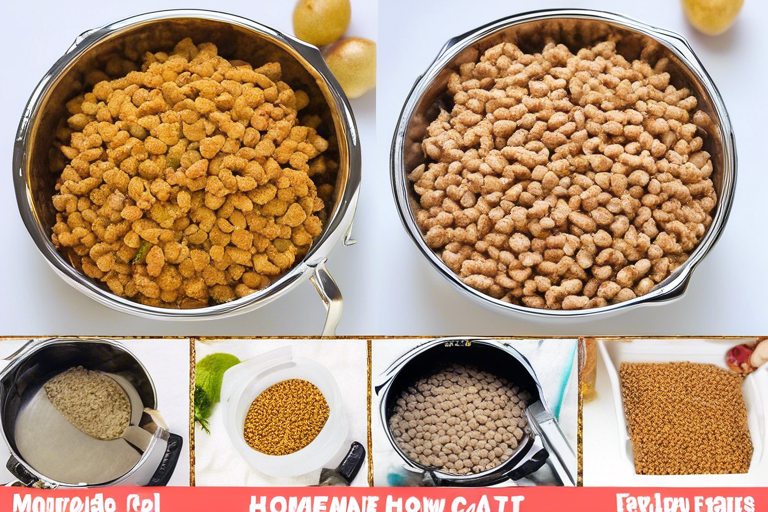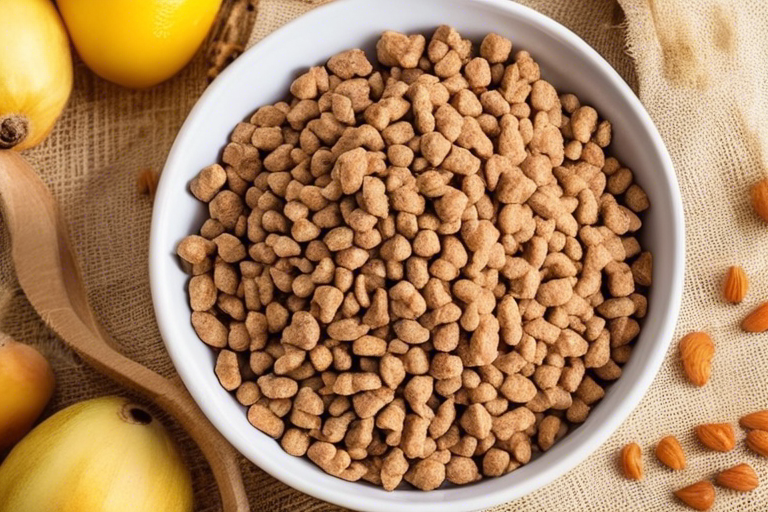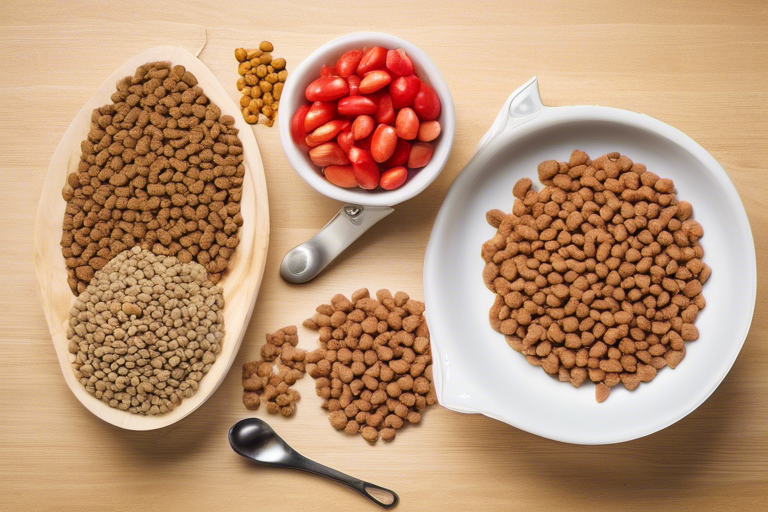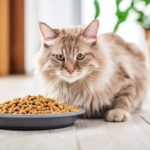Is your furry feline looking a little too skinny? Perhaps they are a picky eater, or maybe there’s an underlying health issue causing them to lose weight. Whatever the reason may be, if you’re looking for homemade cat food to help your cat gain weight, you’re in the right place. In this article, we will provide you with tips and recipes to fatten up your kitty and ensure their well-being.
It’s important to note that before making any changes to your cat’s diet, you should consult with your veterinarian. They will be able to guide you based on your cat’s specific needs and health conditions. Homemade cat food can be a solution for weight gain if your cat is losing weight due to insufficient food intake, rather than a health problem.
Tips to Help Your Cat Gain Weight
When it comes to helping your cat gain weight, there are a few tips you can follow to ensure their success. Here are some suggestions to keep in mind:
1. Incorporate Healthy Fats
Contrary to popular belief, not all fats are bad for cats. While it’s important to monitor their fat intake to prevent obesity, including some healthy fats in their diet can help with weight gain. Good fat sources for homemade cat food include fatty fish, vegetable oils, and animal fat. These fats provide concentrated calories and can help fatten up your thin cat. Additionally, fish oil can be added to their food to increase calorie content and improve their overall health.
2. Entice with Bacon Fat (In Moderation)
If your cat is a picky eater, you can try adding a small amount of bacon fat to their food to entice them. Bacon fat is high in calories and can help your cat put on some pounds. However, it’s important to use bacon fat in moderation and consult with your veterinarian before incorporating it into their diet. Regular consumption of bacon fat can be harmful to your cat’s heart, kidneys, and liver due to its high saturated fat and sodium content.
3. Avoid Rice and Potatoes as Main Ingredients
While cats can eat potatoes, rice, and other non-grain carbohydrates, it’s important to remember that they are obligate carnivores. Their diet should primarily consist of meat-based nutrition to provide essential amino acids like taurine. Non-grain carbohydrates can be used as complementary ingredients in cat food recipes, but they should not replace meat as the main component. Overfeeding on these ingredients can lead to protein malnutrition and contribute to health issues such as diabetes.
4. Consider Including Chicken Skin
If your cat is thin and needs extra calories, chicken skin can be added to their homemade food. While it’s important to avoid feeding them raw or fried chicken skin, cooked chicken skin can provide additional calories and nutrients. Feral or wild cats also consume the skin when they hunt birds, so it’s a natural part of their diet. However, it’s crucial to remove any spices, oil, garlic, or onion from the chicken skin before feeding it to your cat.
5. Enhance the Appeal of the Food
Some cats are picky eaters, and enhancing the appeal of their food can increase their appetite and help them gain weight. You can experiment with the consistency, presentation, shape, and temperature of their food to entice them. Adding the broth from boiled chicken can make the food more appealing, as many cats prefer warm meals. Remember to avoid adding salt or condiments to their food, as it can be harmful to their health.

Best Homemade Cat Food Recipes to Gain Weight
Now that you’re familiar with the tips to help your cat gain weight, let’s dive into some delicious homemade cat food recipes that can help fatten up your furry friend. Here are a few options:
Recipe 1: Chicken and Rice
Ingredients:
- 1 cup of boiled chicken
- 1/4 cup of cooked and soft brown or white rice
- 1/4 cup of low-sodium chicken or beef broth
- 1/2 teaspoon of fish oil
Instructions:
- Cook the chicken and rice separately until fully cooked.
- Chop the chicken into small pieces or use a food processor to create a pate-like consistency.
- Mix the chicken, rice, and broth in a bowl, ensuring they are well combined.
- Add the fish oil and stir until thoroughly mixed.
- Serve the homemade cat food in small portions.
Tip: Start by adding a small amount of rice to the mixture if your cat is not accustomed to it. You can also incorporate feline probiotic powder or probiotic capsules to aid digestion.
Recipe 2: Chicken and Sweet Potato
Ingredients:
- 1/2 cup of canned tuna (in water)
- 1/4 cup of mashed sweet potato
- 1/4 teaspoon of fish oil
Instructions:
- Drain the canned tuna and place it in a bowl.
- Cook the sweet potato until soft and mash it.
- Mix the mashed sweet potato with the tuna.
- Add the fish oil and stir until well combined.
- Serve the homemade cat food in small portions at room temperature.
Tip: To aid digestion, consider adding feline probiotic powder or probiotic capsules to the mixture.
Recipe 3: Salmon and Eggs
Ingredients:
- 2 eggs
- 4 ounces of salmon
Instructions:
- Boil the eggs and allow them to cool.
- Bake the salmon at 350 degrees Fahrenheit for 15 minutes.
- Finely chop the salmon and eggs using a food processor.
- Serve the homemade cat food in small portions.
Tip: Cooking the salmon thoroughly ensures that any parasites in the fish are eliminated.

Recipe 4: Cooked Rabbit and Poultry
Ingredients:
- 1 pound of pre-ground rabbit (meat, bones, and liver)
- 1/2 pound of boneless chicken or turkey meat/fat
- 1/2 cup of water (or more if desired)
- 2 boiled or scrambled eggs
- 1 tablespoon of fish oil
- 25 mg of vitamin B-complex
Instructions:
- Thaw the pre-ground rabbit.
- Cut the boneless chicken or turkey meat/fat into small pieces.
- Whisk together water, vitamin B-complex, and fish oil in a small bowl.
- Combine the pre-ground rabbit, ground chicken/turkey, and eggs in a large bowl. Mix well.
- Pour the supplement mixture over the meat mixture and mix again.
- Use a food processor to blend the mixture to a chunky pate texture.
- Serve the homemade cat food in small portions.
Tip: This recipe can be made in larger quantities and frozen for future use. Always thaw and serve fresh portions.
Recipe 5: Turkey and Pumpkin
Ingredients:
- 1/2 cup of cooked turkey (boiled or baked)
- 1/4 cup of canned pumpkin (puree, not pie filling)
- 1/2 teaspoon of fish oil
Instructions:
- Cook the turkey until fully cooked.
- Shred the cooked turkey into small pieces.
- Mix the shredded turkey and canned pumpkin in a bowl.
- Add the fish oil and stir until well combined.
- Serve the homemade cat food in small portions.
Tip: You can substitute chicken for turkey in this recipe if desired.
Recipe 6: Scrambled Eggs
Ingredients:
- 2 fresh eggs
- 1 teaspoon of butter
Instructions:
- Fry the eggs using a small amount of butter.
- Serve the scrambled eggs in small portions.
Tip: Ensure that the eggs are thoroughly cooked before serving them to your cat.
Recipe 7: Tuna and Oats
Ingredients:
- Canned low-sodium tuna in water
- Oats (instant or cooked according to package instructions)
- 1 tablespoon of fish oil
Instructions:
- Drain the tuna and place it in a bowl.
- Cook or microwave the oats according to the instructions.
- Add the fish oil to the tuna and oats.
- Use a food processor to blend the mixture to a slightly chunky consistency.
- Serve the homemade cat food in small portions.
Tip: Fresh tuna or salmon can be used as an alternative to canned tuna in this recipe.
Conclusion
With the right ingredients and recipes, homemade cat food can be a great way to help your skinny cat gain weight. However, it’s crucial to consult with your veterinarian before making any dietary changes. They can provide guidance based on your cat’s specific needs and health conditions. Remember to monitor your cat’s weight gain and adjust their food intake accordingly. By following the tips and recipes provided, you can ensure that your cat is on the path to a healthy weight and a happy life.
Disclaimer: This article is for informational purposes only and should not replace professional veterinary advice. Always consult with your veterinarian before making any changes to your cat’s diet or health routine.




3 thoughts on “Homemade Cat Food to Gain Weight: Tips and Recipes”